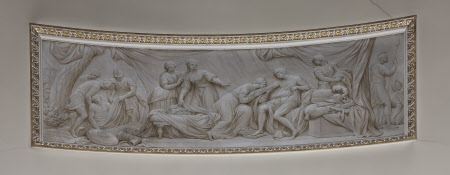Queen Eleanor sucking the Poison from her Husband King Edward I's Wound (after Kauffman)
Biagio Rebecca (Osimo 1735 - London 1808)
Category
Art / Oil paintings
Date
1780 - 1800
Materials
Oil on canvas (grisaille)
Measurements
1450 x 2130 mm
Place of origin
England
Order this imageCollection
Kedleston Hall, Derbyshire
NT 108860
Summary
Oil painting on canvas (grisaille), Queen Eleanor sucking the Poison from her Husband King Edward I's Wound (after Kauffman) by Biagio Rebecca (1735 - 1808). One of a set of four of scenes from English history. Queen Eleanor of Castile (1244/5 – 1290) sucking the poison from a wound in the right arm of her husband King Edward I (1239–1307). In 1270, Edward and Eleanor left to join Louis IX of France on the Eighth Crusade. The crusade was militarily unsuccessful, but Baibars of the Bahri dynasty was worried enough by Edward's presence at Acre that an assassination attempt was made on his life in June 1272. He was wounded in the arm by a dagger that was thought to be poisoned. The wound soon became seriously inflamed, and an English surgeon saved him by cutting away the diseased flesh, but only after Eleanor was led from his bed, "weeping and wailing." A later fanciful tale embellished this incident, claiming Eleanor has sucked the poison from the wound. The 1776 painting by Angelica Kauffman, from which this design derives is now in The Huntington, California (acquired in 2001). A stipple engraving was made by William Wynne Ryland (London 1732 – Tyburn 1783), 1 March 1780, which is the same viewpoint as this grisaille.
Provenance
Recorded in Saloon, c.1787; and thence by descent until purchased in 1987 by the National Trust from Francis Curzon, 3rd Viscount Scarsdale (1924-2000).
Credit line
Kedleston Hall, The Scarsdale Collection (acquired with the help of the National Heritage Memorial Fund and transferred to the National Trust in 1987)
Marks and inscriptions
n
Makers and roles
Biagio Rebecca (Osimo 1735 - London 1808), artist
